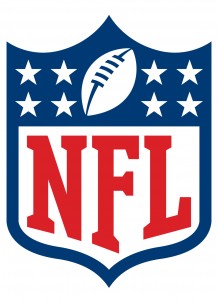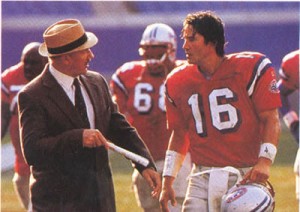
I’m sure that many of you have been following the news of the NFLPA and the NFL team owners’ mediation talks from the last few weeks. Not only as fans nervous about the prospect of no 2011 season, but also as business owners observing a relative scenario of team owners (business owners) vs. players (employees) — this is an interesting situation to watch unfold.
Quite simply, this a high stakes money grab, on both sides. Owners and players can’t figure out a mutually agreeable way to split all those billions that come from TV contracts, ticket sales, merchandise, sponsorship deals, and so forth. And as business owners, it’s good to pay attention as things shake out.
A Brief History
Here are five significant events that led to the player lockout, which happened this past Saturday (3/12/2011):
- 2008 (not coincidentally, the same year that the U.S. economy began to feel major effects from the recession): after 21 years of relatively peaceful relations, the NFL opts out of its collective bargaining agreement with the NFL Players Association, saying its costs are too high and it needs givebacks from the players. As a result, the 2010 season would have no salary cap.
- January 2011: the players’ union files collusion claim against NFL owners regarding lack of movement of restricted free agents. Both sides meet for short negotiations one day before Super Bowl in Dallas.
- February 2011: the NFL files charges against the union with National Labor Relations Board for not bargaining in good faith because of its plans to decertify.
- March 3, 2011: with the CBA (collective bargaining agreement) due to expire at midnight, the two sides agree to extend the pact for another 24 hours.
- March 11, 2011: the NFLPA decertifies, meaning it declared itself out of the business of representing players. That means no team workouts, and, if the labor strife lasts long enough, no games in 2011.
(chronology courtesy of ESPN.com)
Industry Civil War
This situation is so interesting from many different viewpoints. This article from Blogging the Boys outlines yet another struggle — the ongoing internal struggle amongst the owners regarding salary caps/floors and how not sharing revenues amongst all teams could hurt the small-market teams, causing their overhead costs to increase, and ultimately jeopardizing their (and the league’s) sustainability.
Today, ownership is pulling in two mutually exclusive directions at once. The Have-Nots want a revenue sharing agreement that guarantees financial viability and on-the-field competitiveness for small market teams while the Haves think the “Bottom-feeders,” “pick-pockets,” “freeloaders,” and “commie bastards” should start carrying their own weight and find ways to increase their own revenue streams. You know, like, build a stadium or something. Or move to LA. Or something.
So on one hand, you have a team system that is fighting amongst itself. There are arguments for both sides: the argument that winning should be rewarded, and the argument that revenues should be equally shared in order to preserve the league as it is.
Any business owner can appreciate both sides of this particular argument — it is something that you deal with on a daily basis. Success of the industry as a whole means its continued sustainability. But is this at the sacrifice of those with more skin in the game? As recruiting business owners, you are torn between the moral obligation of seeing your competitors succeed for the betterment of the recruiting industry as a whole and the personal desire of wanting your own success and working toward being the best in your industry in order to provide a better life for yourself and your family. Where is the balance — at what point is it no longer ‘profitable,’ or ‘right,’ for you, as an individual business owner, to continue succeeding in lieu of the greater good of the collective group? Or is this ever the case?
Team (Business) Owners vs. Players (Employees)
On the other hand, there are the negotiations between the players and the NFL team owners, each of which provides an understandable argument for its own side.
In a snapshot, here’s what is going on:
- The NFL is asking for:
- A reduction of $1 billion in player salaries
- A reduced and controlled rookie wage scale
- An 18-game season (as opposed to 16 games in the regular season)
- The NFLPA, in return, is asking for:
- NFL team owners to show their financial records for proof of profit loss
- No additional games added to the season
- Guaranteed/better/year-round healthcare coverage and retirement funding
(by the way, a little comic relief on the NFLPA website, as it issues a 404 error and redirects you to www.NFLLockout.com with the following message: “Error 404: Football Not Found. Please be patient as we work on resolving this….”)
We could bat around the pros and cons of both sides — we could say that it’s absolutely reasonable for football players, whose jobs require peak physical fitness, to ask for year-round quality heath care to be provided to them; we could argue that owners asking for players to be reasonable in their salary requirements during one of the worst recessions in modern times is acceptable; we could say that adding two more games to the season would be delightful from a fan’s perspective and profitable for the owners, but physically demanding on the players.
From The Recruiting Business Owner’s Perspective
You can argue any of these viewpoints on either side. But the perspective I want you to look at here is that of a business owner. You, as the business owner, have a larger stake in your business than the people you pay to work for you. The team owners are just that — they are the owners. They have more skin in the game than the players. They are the employers, and therefore get to make the rules. Should those rules be reasonable? Absolutely, unless they don’t want employees (players) to work for them. Players/employees should expect reasonable and safe work environments as well as fair wages. However, working for someone doesn’t make you a partner that can dictate how things are to be done. In the words of a commenter from an NBCSports blog:
With everyone making plenty of money (not to mention the additional concessions just made by the NFL in an effort to close the perceived gap) I just can’t get past the reality of the employees telling their employer what they have to do so that they’ll continue to work, as if they (the players) are doing them (the owners) some big favor. The owners were wealthy before they bought their teams and they’ll be wealthy without them. The players? With the exception of a notable few, not so much.
How would you feel if your employees made these kind of demands of you? If they demanded to see your financial books and P&L statements? If you are running your business honestly, of course you should not have any issue with it, but the fact remains that it’s your business and none of theirs what kind of profitability you have.

Now, back to the matter at hand. Will there be a 2011 NFL season? My guess is yes, even it it’s made up of scabs. If you remember the 2000 movie The Replacements, Coach Jimmy McGinty said, “…as of today, you’re all professional football players. You’re being paid to play, and I want to you to remember that, because the men whose places you’ve taken forgot that a long time ago.” There will always be someone willing to make money playing a game. But how many of those would be willing to take on the risk of owning and running a team of people like that? That’s where the real risk is, in my book.
I’m very interested in your thoughts on this situation. Please leave a comment and let’s continue the discussion!